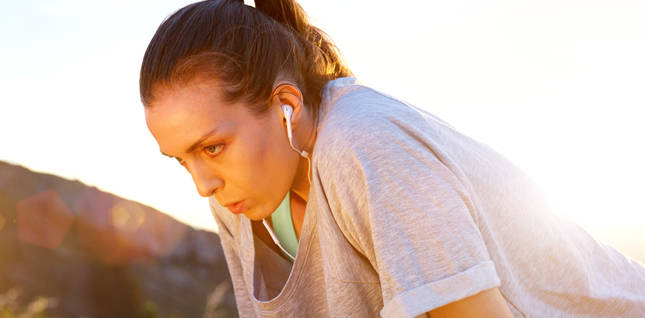
As temperatures rise and you get involved in outdoor activity, your body takes action to keep cool – you sweat. As sweat evaporates off of your skin, it is this mechanism that creates a cooling effect. This cooling effect helps keep your body, and all the internal organs, within a fairly narrow temperature range.
Sometimes, when the temperature and humidity gets high or when you spend a lot of time in the heat, the body’s cooling mechanisms can’t keep up. In the best case you feel hot and look for a place to escape from the heat. The worst case can be fatal.
Let’s take a look at the three primary stages of heat illness, risk factors and what you can do to stay safe during the warm months.
Heat Illness Stages and Symptoms
The stages of heat illness include heat cramps, heat exhaustion and the worst — heat stroke.
Heat cramping symptoms include muscle pain and involuntary spasms. Body temperature may or may not be elevated with heat cramps.
The second stage, heat exhaustion, symptoms include a weak and rapid pulse, low-blood pressure when you are in an upright position, headache, dizziness and general feeling of weakness. A complication that accompanies heat exhaustion is excessive sweating. Rivers of sweat reduces blood volume, depletes the fluid outside of your cell walls and can cause electrolyte loss. Heat exhaustion means you should stop exercise, move to a cooler environment, get fluid replacement started immediately and, in extreme cases, receive intravenous therapy.
Heat stroke, the most serious stage of heat illness, requires immediate medical attention. Heat stroke is a failure of heat-regulating mechanisms in the body, that is brought on by excessive body temperatures. Sweating usually stops, skin becomes hot and dry, body temperature rises to at least 104 degrees Fahrenheit and the entire circulatory system is overtaxed. With some individuals, sweating is still present, but heat gain by the body outstrips the sweat-cooling mechanism. Untreated, heat stroke can result in circulatory collapse, central nervous system damage and death.
Risk Factors
There are certain factors that increase the possibility of heat related problems. They include:
- High heat index. The heat index is a combination of temperature and humidity. When humidity is high, your sweat can’t evaporate as well so it makes it more difficult for your body to cool itself. If the heat index is 91 degrees Fahrenheit or more, take precautions to stay cool. For example, move out of the heat into shade or air conditioning and reduce exercise intensity.
- Sudden temperature changes. When summer temperatures suddenly go from cool to hot, we are all at more risk for heat related problems. The good news is that after some 10 to 14 days of adjustment, you will be more able to tolerate the heat due to internal adjustments made by your body. You become more acclimatized and better able to tolerate hot conditions.
- Certain medications can make you more sensitive to heat (and sunburn). Check the information that comes with your medications to see if your meds make you more heat sensitive.
- People younger than 4 and older than 65 are at higher risk for heat exhaustion.
- Carrying excess weight affects your body’s ability to regulate temperature and cool itself.
Prevention
There are some steps you can take to prevent heat illness. Let’s look at a few strategies.
- Allow your body time to acclimate. Give yourself about two weeks of exposure to hotter conditions to adjust. This may mean reducing the intensity of outdoor activities like walking, cycling, running, gardening and golf until your body makes adjustments. Just take it easier than what is normal for you and consider taking more rest breaks during activities.
- Exercise in the morning, evening or indoors. If you want to do your Miracle Intervals outside, do them in the early morning or late evening when it’s cooler. Another option is to exercise indoors when the heat index becomes dangerous.
- Stay hydrated. Staying hydrated helps your body sweat efficiently. Unless you are doing very long exercise in extreme heat, there is no need for sports drinks or electrolyte replacement. Know that alcohol is a diuretic, so watch the booze consumption at picnics because it affects fat-burning as well as hydration.
- Loose, light-weight, light-colored clothing. This type of clothing helps your body cool more efficiently than dark-colored, heavy clothing that doesn’t allow for good sweat evaporation. Wearing a wide-brimmed hat keeps the sun off of your head and helps prevent skin cancer as well.
Armed with some awareness and tips for preventing heat illness, you can make the most of summer without putting yourself at risk.
